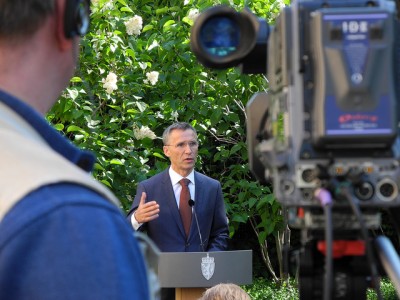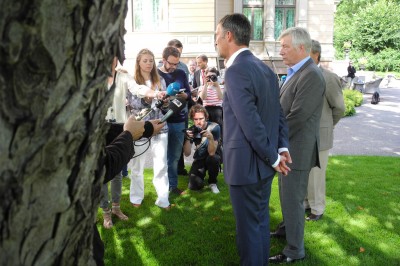NEWS ANALYSIS: Prime Minister Jens Stoltenberg has getting more widespread media coverage, during Norway’s summer doldrums, over his ongoing concern about economic turbulence in Europe. His government has a plan for tackling trouble at home, though, despite his warnings that Norwegians can’t just rely on the country’s oil.

Stoltenberg and Finance Minister, Sigbjørn Johnsen, also of the Labour Party, have been worrying about Norwegian complacency for the past few years, so Stoltenberg’s warnings on Norwegian Broadcasting (NRK) Sunday and in some of the country’s biggest papers on Monday were nothing new. Stoltenberg told newspaper VG that the crisis in Europe can hit Norway in many areas, but it was perhaps more a reminder than anything else.
It was also timely, as more Norwegian companies feel the ill effects of the euro and debt crises. Norsk Hydro, for example, reported major losses last week and blamed the weak economy in its biggest European markets for the low prices of its aluminum. The weak euro and the still-strong Norwegian krone, meanwhile, are causing more problems for most exporters. Prices of Norwegian goods seem even higher for customers abroad, while businesses collecting revenues in euros or dollars have to convert it into lower amounts of kroner at home.
Stoltenberg also warned that rising incomes in Norway can backfire, since they boost costs for employers and can hurt competitiveness. A series of strikes that resulted in higher pay earlier this summer, along with ongoing concerns over high salaries being paid in the booming oil and offshore sector also can ultimately cause problems for other sectors.

But as in 2008, when the international finance crisis first hit, Stoltenberg and his government have more ammunition than most in their positions to respond to signs of economic weakness in Norway. While other governments have to make dramatic cuts in social welfare services and stagger under heavy debt, Norway has a huge surplus and can tap into its oil fund if needed. The government has tried to cut back on use of Norway’s oil revenues, which mostly are stashed away for future generations, but Stoltenberg has shown he’s ready to use them if needed to pump up the economy and generate more jobs.
As newspaper Dagsavisen pointed out on Tuesday, the state can hand more oil revenues over to local governments to rehabilitate schools, nursing homes and other public buildings that need renovation anyway. Such construction projects create jobs. The state can also fund more needed improvements to Norway’s road and rail systems, and allocate more money for expansion of universities and hospitals.
Interest rates are already historically low, but as the head of Norway’s central bank himself indicated earlier this year, they can be lowered further if needed. Norges Bank’s key lending rate was lowered from 1.75 percent to its current 1.5 per cent last spring “but it’s not zero yet,” bank boss Øystein Olsen said.
Cause for concern, but lubrication at hand
Stoltenberg has good reason for concern, not least since repeated attempts by EU leaders to deal with the euro and debt crises fail. With even Germany now sputtering and Spain and Italy seemingly on the brink, Norway must be prepared for the worst, Stoltenberg said. But he can rely on Norway’s oil himself to help fend off a crisis at home, despite his admonishment that Norwegian’s shouldn’t rely on oil themselves.
He and his fellow ministers in the left-center coalition he’s held together for seven years won praise for how they responded to the finance crisis in 2008. Even the opposition, keen to oust Stoltenberg’s coalition in national elections next year, has had to begrudgingly admit that Norway and its economy have continued to do well amidst crisis outside its borders and there’s not much to complain about.
It’s more the complacency Stoltenberg seemed compelled to interrupt his summer holidays once again over. He gathered the press troops last summer, too, and he grabbed headlines over the euro crisis again this week. Now he needs to make sure Norwegians are paying attention.
Views and News from Norway/Nina Berglund
Please support our news service. Readers in Norway can use our donor account. Our international readers can click on our “Donate” button:

